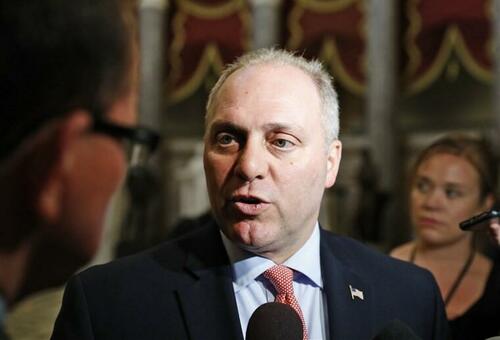
Update (1310ET): Steve Scalise (R-LA) has been nominated for GOP Speaker, according to Politico's Olivia Beavers.
BREAKING: SCALISE wins the House GOP speakership nomination, sources tell me. He defeats Jordan for the gavel.
— Olivia Beavers (@Olivia_Beavers) October 11, 2023
113 to 99, I’m told
A House floor vote will follow sometime this afternoon.
* * *
Update (1205ET): House Republicans have successfully tabled a motion to change the rules on the speaker vote, after Rep. Steve Scalise (R-LA) allies rallied to defeat the measure.
According to Punchbowl News' Jake Sherman, "This puts SCALISE on the brink of the nomination to be House speaker."
BREAKING -- HOUSE REPUBLICANS have tabled a motion to change the rules on the speaker vote.
— Jake Sherman (@JakeSherman) October 11, 2023
SCALISE's whip operation, which was in overdrive over the last few days trying to defeat the measure.
This puts SCALISE on the brink of the nomination to be House speaker.
* * *
After ousting Kevin McCarthy as Speaker, House Republicans on Wednesday kicked off the process of electing his replacement - which could take a while.
The front runners for the position are Reps. Jim Jordan (R-OH), Chair of the House Judiciary Committee, and Steve Scalise (R-LA), House Majority Leader.
Starting things off was a proposed amendment to the voting rules by Rep. Chip Roy (R-TX), which would require a nominee to secure 217 votes in the conference before the vote heads to the floor. The purpose of this is to avoid a repeat of the drama that occurred in January of this year, when McCarthy's election took more than a dozen ballots to win the speakership.
As for the Speakership vote, btw Reps Scalisse and Jordan “it could go either way,” Republicans tell press.
— Ellie Sennett (@EllieMSennett) October 11, 2023
RIGHT NOW: They are voting to table a proposed rule change intro’d by Rep Chip Roy.
Catered lunch deliveries just rolled into the committee, indicating long day ahead 🥪 pic.twitter.com/WnabOD8w6W
As The Hill notes, getting 217 votes won't be an easy feat. Per Roy's proposal:
- The process starts with a majority vote for a candidate.
- If a candidate fails to get 217 votes, a Q&A session takes place, before a secret ballot vote.
- If a candidate gets less than 217 votes again, the process repeats with a Q&A session and another secret ballot vote.
- If that vote ends with a candidate getting less than 185 votes, the process restarts. A candidate with 217 votes is declared a winner. If a candidate gets 185 to 216 votes, there is a Q&A followed by a roll call vote.
- If that ends with a candidate getting between 185 to 216 votes, there is another Q&A session and roll call vote.
- If no candidate gets 217 votes in that vote the process restarts.
- Otherwise, the candidate with 217 votes is declared a winner.
Republicans are now voting on whether to table Roy's proposal, with Rep. Steve Womack (R-AR) saying: "The amendment is flawed in many respects, personally I think it empowers a handful of people to be able to stop the movement of a Speaker’s election in its tracks."
If the motion to table is successful, the conference will move on to the secret ballot election for speaker. But if the motion to table fails, "then there would be a secondary amendment offered," according to Womack.
Update (1418ET): Following Steve Scalise’s nomination for House Speaker (formal vote coming up later), Rep. Jim Jordan threw his support behind his colleague.
NEWS — JIM JORDAN just offered to nominate Scalise on the House floor.
JORDAN getting behind Scalise.
— Jake Sherman (@JakeSherman) October 11, 2023
* * *
Update (1310ET): Steve Scalise (R-LA) has been nominated for GOP Speaker, according to Politico‘s Olivia Beavers.
BREAKING: SCALISE wins the House GOP speakership nomination, sources tell me. He defeats Jordan for the gavel.
113 to 99, I’m told
— Olivia Beavers (@Olivia_Beavers) October 11, 2023
A House floor vote will follow sometime this afternoon.
* * *
Update (1205ET): House Republicans have successfully tabled a motion to change the rules on the speaker vote, after Rep. Steve Scalise (R-LA) allies rallied to defeat the measure.
According to Punchbowl News‘ Jake Sherman, “This puts SCALISE on the brink of the nomination to be House speaker.”
BREAKING — HOUSE REPUBLICANS have tabled a motion to change the rules on the speaker vote.
SCALISE’s whip operation, which was in overdrive over the last few days trying to defeat the measure.
This puts SCALISE on the brink of the nomination to be House speaker.
— Jake Sherman (@JakeSherman) October 11, 2023
* * *
After ousting Kevin McCarthy as Speaker, House Republicans on Wednesday kicked off the process of electing his replacement – which could take a while.
The front runners for the position are Reps. Jim Jordan (R-OH), Chair of the House Judiciary Committee, and Steve Scalise (R-LA), House Majority Leader.
Starting things off was a proposed amendment to the voting rules by Rep. Chip Roy (R-TX), which would require a nominee to secure 217 votes in the conference before the vote heads to the floor. The purpose of this is to avoid a repeat of the drama that occurred in January of this year, when McCarthy’s election took more than a dozen ballots to win the speakership.
As for the Speakership vote, btw Reps Scalisse and Jordan “it could go either way,” Republicans tell press.
RIGHT NOW: They are voting to table a proposed rule change intro’d by Rep Chip Roy.
Catered lunch deliveries just rolled into the committee, indicating long day ahead 🥪 pic.twitter.com/WnabOD8w6W
— Ellie Sennett (@EllieMSennett) October 11, 2023
As The Hill notes, getting 217 votes won’t be an easy feat. Per Roy’s proposal:
- The process starts with a majority vote for a candidate.
- If a candidate fails to get 217 votes, a Q&A session takes place, before a secret ballot vote.
- If a candidate gets less than 217 votes again, the process repeats with a Q&A session and another secret ballot vote.
- If that vote ends with a candidate getting less than 185 votes, the process restarts. A candidate with 217 votes is declared a winner. If a candidate gets 185 to 216 votes, there is a Q&A followed by a roll call vote.
- If that ends with a candidate getting between 185 to 216 votes, there is another Q&A session and roll call vote.
- If no candidate gets 217 votes in that vote the process restarts.
- Otherwise, the candidate with 217 votes is declared a winner.
Republicans are now voting on whether to table Roy’s proposal, with Rep. Steve Womack (R-AR) saying: “The amendment is flawed in many respects, personally I think it empowers a handful of people to be able to stop the movement of a Speaker’s election in its tracks.”
If the motion to table is successful, the conference will move on to the secret ballot election for speaker. But if the motion to table fails, “then there would be a secondary amendment offered,” according to Womack.
Loading…






